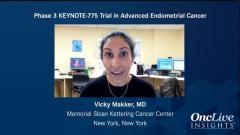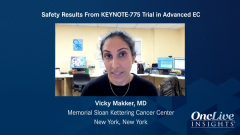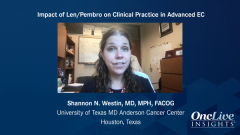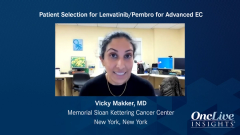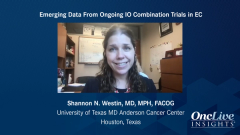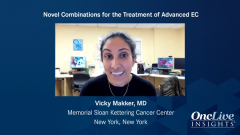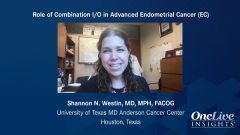
Novel Combinations for the Treatment of Advanced EC
Experts in gynecologic oncology discuss novel combination strategies for the treatment of advanced endometrial cancer.
Episodes in this series

Shannon N. Westin, MD, MPH, FACOG: Outside of the trials in progress, we also saw some data that were really informative and exciting. In lieu of what we were just talking about around PARP inhibitors in endometrial cancer, there is a thought that endometrial cancers may have as high levels of homologous recombination deficiency as ovarian cancer. Bobbie Rimel, MD, Helen MacKay, MD, and David Bender, MD, as a part of GY012, explored the backbone of cediranib as a single agent, with or without olaparib, in patients with recurrent endometrial cancer. They also explored olaparib as a single agent in this population. It was an unselected population, although they are looking at the presence of homologous recombination deficiency on the back end. We don’t have those translational results, but they compared progression-free survival between the cediranib, olaparib, and cediranib-olaparib arms. Although there was a numerical trend toward improvement in progression-free survival for the combination arm, it did not achieve statistical significance. In fact, the olaparib seemed to not even be that great on its own compared with the cediranib. That trial is continuing with 3 new arms of combinations to see if they can perform better than the cediranib-only backbone. That was an interesting trial. It was a little negative, not as good as we hoped, but still exciting data that were presented at the SGO [Society of Gynecologic Oncology annual meeting].
Now, for something completely different. I was the principal investigator for a study called NPAC, in which we were exploring the addition of a drug called enzalutamide, which is an androgen receptor antagonist. That drug was being added to the backbone of paclitaxel and carboplatin. This was a selective trial, because we know that the androgen receptor is expressed very highly in endometrioid-type tumors, but maybe not as high in some of the nonendometrioid type. We selected patients with nonendometrial tumors and then treated them with the combination of enzalutamide plus the chemotherapy. We found very high levels of response. About 70% of patients had confirmed response. Unconfirmed response is even a little higher for patients who came off for other reasons. That was really exciting. The progression-free survival was higher than we would expect for chemotherapy alone. That study was really a translational study. We’re trying to assess which patients did benefit and which didn’t, but we’re excited about the early data and hope to move that combination forward in a larger phase 3 study. Although, as you can tell, it’s a pretty crowded space, and so it’s to be determined where it fits in.
Vicky Makker, MD: Finally, we have the SIENDO or ENGOT-EN5/GOG-3055 study. As we know, patients with advanced or relapsed endometrial cancers have limited options post-progression and have poor prognosis. Selinexor is a novel oral selective inhibitor of nuclear export, which essentially forces nuclear retention and activation of tumor suppressor proteins. Selinexor in combination with low-dose dexamethasone has been approved in myeloma. This agent is also approved for relapsed/refractory diffuse large B-cell lymphoma. Selinexor has shown activity in a number of hematologic malignancies as well as solid tumors. In a phase 2 study of selinexor in advanced endometrial cancers, the disease control rate was 35%.
The aim of this study, in the absence of approved maintenance therapies for endometrial cancers, is to evaluate the efficacy of selinexor compared with placebo as maintenance therapy in patients with advanced endometrial cancers who have achieved either a partial response or a complete response after completing at least 12 weeks of platinum or taxane-based therapy. This trial includes not only the usual histotypes in endometrial cancer, but also patients with uterine carcinosarcomas. The primary end point of this study is progression-free survival, and patients will continue on treatment until progression. This study is also enrolling patients.
For me, this is a very exciting time to be involved in clinical research and to take care of patients with advanced gynecologic malignancies and endometrial cancers. I think that Study 309/KEYNOTE-775 is the beginning of many exciting developments in advanced or recurrent endometrial cancers. We not only covered the important end points of this study today, but have also spoken about new and exciting therapies on the horizon. There is so much more to come. We quickly have reached the ceiling with regard to chemotherapy and its activity in this malignancy. We are going to have a number of very interesting developments in advanced endometrial cancers in the upcoming years. Certainly, I’m very excited to be a part of this journey. Thank you.
Shannon N. Westin, MD, MPH, FACOG: Looking ahead, we’re going to see a lot of large trials read out over the next few years. Fingers crossed, they will all be wildly positive. But where we are right now, we have to do a better job of selecting the right treatment for the right patient. We’re seeing some trials fail, or maybe not succeed as well as we want, because we’re still lumping everybody together and treating everybody the same. The trials that have been successful are the ones where we’ve been teasing patient populations out, whether that be based on histology or molecular aberrations. It’s really on us over the next few years to do a good job of identifying appropriate selection criteria to make sure we’re putting the right patient with the right treatment, so that we’re not wasting people’s time, not giving them unnecessary toxicity, and we’re improving outcomes and helping people live longer. Going forward, that’s where our focus needs to be.
Transcript Edited for Clarity


